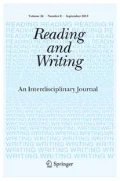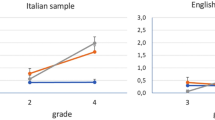Abstract
This study focused on the feasibility of agroup-administered paper-and-pencil lexical-decisiontest as a plausible alternative or supplementary tool for the assessment of readingskills. Lexical-decision tests and oral-readingtests were administered to 130 Dutch studentsfrom primary grades 1, 2, 3, 5, and 6. Correlations were moderate to high in low grades, butdeclined in the high grades. The reliability ofthe lexical-decision test assessed by means ofa test--retest procedure was generally good. Asecond presentation of the lexical-decisiontest caused repetition effects (i.e., betterperformance on the second test), but generallyremained within reasonable limits. The presenceof different numbers of pseudowords (25%vs. 75%) in both lexical decision and oralreading, indicated that a large number ofpseudowords made oral reading harder, butlexical decision easier. Educational andclinical implications are discussed.
Similar content being viewed by others
References
Bosman, A.M.T. & de Groot, A.M.B. (1996). Phonologic mediation is fundamental to reading: Evidence from beginning readers. The Quarterly Journal of Experimental Psychology, 49A, 715–744.
Bowers, J.S., Damian, M.F. & Havelka, J. (2002). Can distributed orthographic knowledge support word-specific long-term priming? Apparently so. Journal of Memory and Language, 46, 24–38.
Brus, B.T. & Voeten, M.J.M. (1973). Een-Minuut-Test [One-Minute test]. Nijmegen, The Netherlands: Berkhout.
Carlisle, J.F., Stone, C.A. & Katz, L.A. (2001). The effects of phonological transparency on reading derived words. Annals of Dyslexia, 51, 249–274.
Chumbley, J.I. & Balota, D.A. (1984). A word's meaning affects the decision in lexical decision. Memory and Cognition, 12, 590–606.
Dannenbring, G.L. & Briand, K. (1982). Semantic priming and the word repetition effect in a lexical decision task. Canadian Journal of Psychology, 36, 435–444.
de Groot, A.M.B. (1985). Word-context effects in word naming and lexical decision. The Quarterly Journal of Experimental Psychology, 37, 281–297.
Evers, A., van Vliet-Mulder, J.C. & Groot, C.J. (2000). Documentatie van tests en testresearch in Nederland [Documentation of tests and test research in the Netherlands]. Assen, The Netherlands: Van Gorcum.
Frost, R., Katz, L. & Bentin, S. (1987). Strategies for visual word recognition and orthographical depth: A multilingual comparison. Journal of Experimental Psychology: Human Perception and Performance, 13, 104–115.
Forster, K.I. & Davis, C. (1984). Repetition priming and frequency attenuation in lexical access. Journal of Experimental Psychology: Learning, Memory, and Cognition, 10, 680–698.
Gibbs, P. & Van Orden, G.C. (1998). Pathway selection's utility for control of word recognition. Journal of Experimental Psychology: Human Perception and Performance, 24, 1162–1187.
Katz, L. & Feldman, L.B. (1983). Relation between pronunciation and recognition of printed words in deep and shallow orthographies. Journal of Experimental Psychology: Learning, Memory, and Cognition, 9, 157–166.
Kohnstamm, G.A., Schaerlaekens, A.M., de Vries, A.K., Akkerhuis, G.W. & Froonincksx, M. (1981). Nieuwe streeflijst woordenschat voor 6-jarigen [Target list vocabulary for 6-year-old children]. Lisse, The Netherlands: Swets & Zeitlinger.
Kusters, E.D.M. (1987). Self-corrections in oral reading: Some aspects of the reading process of good and poor readers. Unpublished doctoral dissertation. University of Nijmegen, Nijmegen, the Netherlands.
Lupker, S.J., Brown, P. & Colombo L. (1997). Strategic control in a naming task: changing routes or changing deadlines? Journal of Experimental Psychology: Learning, Memory, and Cognition, 23, 570–590.
McQuade, D. (1981). Variable reliance on phonological information in visual word recognition. Language and Speech, 24, 99–109.
Monsell, S., Patterson, K., Graham, A., Hughes, C.H. & Milroy, R. (1992). Lexical and sub-lexical translations of spelling to sound: Strategic anticipation of lexical status. Journal of Experimental Psychology: Learning, Memory, and Cognition, 18, 452–467.
Oliphant, G.W. (1983). Repetition and recency effects in word recognition. Australian Journal of Psychology, 35, 393–403.
Ratcliff, R. & McKoon, G. (1988). A retrieval theory of priming in memory. Psychological Review, 95, 385–408.
Scarborough, D.L., Cortese, C. & Scarborough, H.S. (1977). Frequency and repetition effects in lexical memory. Journal of Experimental Psychology: Human Perception and Performance, 3, 1–17.
Seidenberg, M.S. & McClelland, J.L. (1989). A distributed, developmental model of word recognition and naming. Psychological Review, 96, 523–568.
Seidenberg, M.S., Petersen, A., MacDonald, M.C. & Plaut, D.C. (1996). Pseudohomophone effects and models of word recognition. J ournal of Experimental Psychology: Learning, Memory, and Cognition, 22, 48–62.
Sloman, S.A., Hayman, C.A.G., Ohta, H., Law, J. & Tulving, E. (1988). Forgetting in primed fragment completion. Journal of Experimental Psychology: Learning, Memory, and Cognition, 14, 223–239.
Staphorsius, K., Krom, R.S.H. & de Geus, K. (1988). Frequenties van woordvormen en letterposities in jeugdlectuur [Frequencies of word forms and letter positions in youth literature]. Arnhem, The Netherlands: CITO.
Stone, G.O. & Van Orden, G.C. (1993). Strategic control of processing in word recognition. Journal of Experimental Psychology: Human Perception and Performance, 19, 744–774.
Taylor, T.E. & Lupker, S.J. (2001). Sequential effects in naming: A time-criterion account. Journal of Experimental Psychology: Learning, Memory, and Cognition, 27, 117–138.
Underwood, G. & Blatt, V. (1996). Reading and understanding. Oxford: Blackwell Publishers Ltd.
van Bon, W.H.J., Bouwmans, M., Broeders, I., Hoevenaars, L. & Jongeneelen, J.E. (2003). Een klassikale toets voor 'technische leervaardigheid': vragen van validiteit en betrouw-baarheid [Lexical decision and oral reading: validity and reliability]. Tijdschrift voor Orthopedagogiek, 42, 71–86.
van Bon, W.H.J. & Libert, J.E.A. (1997). Oral reading and silent reading compared: Evidence for a subtype of poor readers. Polish Psychological Bulletin, 28, 59–70.
van Bon, W.H.J., Tooren, P.H. & van Eekelen, K.W.J.M. (2000). Lexical decision and oral reading by poor and normal readers. European Journal of Psychology of Education, 3, 259–270.
van der Geest, A., Swüste, W. & Raeve, J. (1978). Praxis 14: Spellingwijzer [Praxis 14: Spelling guide]. Hertogenbosch, The Netherlands: Malmberg.
Van Orden, G.C., Holden, J.G., Podgornik, M.N. & Aitchison, C.S. (1999). What swimming says about reading: Coordination, context, and homophone errors. Ecological psychology, 11, 45–79.
Van Orden, G.C., Stone, G.O., Garlington, K.L., Markson, L.R., Pinnt, G.S., Simonfy, C.M. & Brichetto, T. (1992). "Assembled" phonology and reading: A case study in how theoretical perspective shapes empirical investigation. In R. Frost and L. Katz (Eds.), Orthography, phonology, morphology, and meaning (pp. 249–292). Amsterdam: Elsevier Science Publishers B.V.
Waters, G.S. & Seidenberg, M.S. (1985). Spelling-sound effects in reading: Time-course and decision criteria. Memory and Cognition, 13, 557–572.
Rights and permissions
About this article
Cite this article
Gijsel, M.A., van Bon, W.H. & Bosman, A.M. Assessing reading skills by means of paper-and-pencil lexical decision: Issues of reliability, repetition, and word-pseudoword ratio. Reading and Writing 17, 517–536 (2004). https://doi.org/10.1023/B:READ.0000044599.98083.d8
Issue Date:
DOI: https://doi.org/10.1023/B:READ.0000044599.98083.d8



